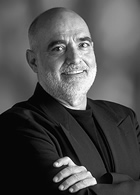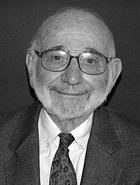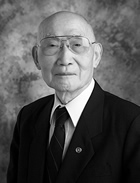This page has been archived and is being provided for reference purposes only. The page is no longer being updated, and therefore, links on the page may be invalid.
|
Click an image to download a high-resolution version in .zip format. |
Johanns Recognizes Four ARS Scientists
By Sharon DurhamDecember 7, 2005
WASHINGTON, Dec. 7—Agriculture Secretary Mike Johanns announced today that four Agricultural Research Service (ARS) scientists have been chosen for the ARS Science Hall of Fame. The scientists have made important research contributions in plant physiology and phytochemistry, enzymology, food science and poultry health.
"These scientists have contributed greatly to improving the safety and quality of our food supply, and I'm proud that they are being honored for their many accomplishments," said Johanns. "During the farm bill forums we held this summer and fall, I heard loudly and clearly that our farmers and ranchers value agricultural research and count on our scientists to make their work more productive."
The inductees are veterinary medical officer Charles W. Beard, microbiologist Nelson A. Cox, chemist Sigmund Schwimmer, and plant scientist Tien C. Tso. They will receive plaques commemorating their achievements during a ceremony tonight at the U.S. National Arboretum. Permanent plaques will be on display at the ARS National Visitor Center in Beltsville, Md.
The ARS Science Hall of Fame, begun in 1986, recognizes agency researchers for outstanding career achievements in agricultural science. Inductees are nominated by their peers and must be retired or eligible for retirement.
Beard joined ARS in 1965 at the Southeast Poultry Laboratory in Athens, Ga. During his 28-year career at ARS, Beard developed the test for the detection of avian influenza antibodies in serum and egg yolk. He has conducted experimental studies and published papers on a wide variety of poultry disease subjects including serology, vaccines, the origins of poultry diseases and disease containment.
Cox began his career with ARS in 1971 and still works for the agency. In the 1970s, Cox and his colleagues conclusively demonstrated that fecally contaminated, condemned poultry carcasses were microbiologically indistinguishable from inspection-passed carcasses after reprocessing. Results from this pivotal study convinced Congress of the merits of reprocessing. Cox and his coworkers also identified hatcheries as significant reservoirs for Salmonella and conducted extensive research on intervention strategies.
Schwimmer retired from ARS in 1974, but continues to collaborate with scientists at the agency's Western Regional Research Center in Albany, Calif. His research on the structure and function of enzymes and their varied and powerful uses in food preparation and preservation has earned him international recognition and transformed the U.S. food industry. His work on low-temperature preservation contributed to the foundation of techniques for modern frozen food. His other research led to improved practices in brewing, baking and distilling and innovative advances in health and nutrition.
Tso joined ARS in 1952 and retired in 1983. During his career, he was a leader in studies of the roles of organic compounds such as sugars, organic acids, amino acids and sterols in plants, and their metabolism in the plants. His research findings have broad applications in flowers, fruits and other plants. Tso also played a key role in establishing a scientific team that helped resolve a major wheat trade issue between the United States and China in the early 1990s.
ARS is the U.S. Department of Agriculture's chief in-house scientific research agency.




